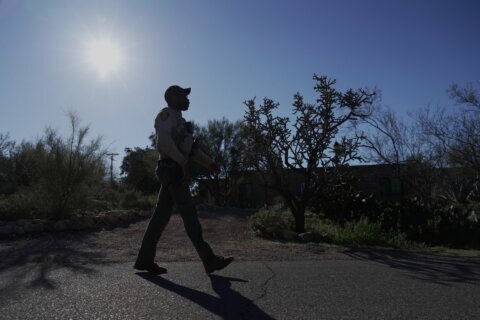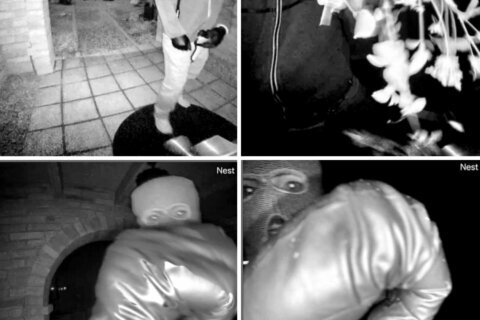While a small number of demonstrators around the country openly flout government stay-at-home orders geared toward stopping the spread of the deadly coronavirus, a different battle is playing out in some communities with an unlikely group of protesters: the police.
Despite warnings from health officials that social distancing and the wearing of face coverings can help flatten the statistical curve of nationwide infections, from Texas to Washington state a handful of officers sworn to uphold the law have in recent weeks publicly expressed their opposition to government regulations aimed at keeping citizens from transmitting the virus to others.
A showdown in Texas
The latest high-profile protest by law enforcement came on Wednesday from the head of a Houston police union, who penned an open letter forcefully taking issue with a new order requiring face coverings by anyone in public over 10 years of age, with some exceptions. The order carries a $1,000 fine for noncompliance.
Despite Harris County Judge Lina Hidalgo’s insistence that officers should use discretion in enforcing the new order, it drew the immediate ire of Joe Gamaldi, president of the Houston Police Officers’ Union, whose letter attacked the judge’s “critical thinking skills” and called her new mandate “idiotic.”
The police union president said that while officers support the public wearing masks, police departments do not have the resources to enforce “draconian” face covering orders. He also took issue with the way he believes such enforcement could negatively impact law enforcement’s relationship with the community.
“Our officers work every single day to bridge the gap with our community and earn their trust,” Gamaldi wrote, adding, “We will not stand idly by and allow Hidalgo to tear that bridge down, with her horrific leadership and echo chamber decision making.”
Asked for comment about the police union’s comments, the judge’s office told CNN the Houston-area community has come together during this crisis to save lives.
“The public health interventions we’ve enacted with the support of our residents is already making a difference with over 4,500 lives saved, but we cannot let our guard down,” said Rafael Lemaitre, spokesperson for Hidalgo. “Politicizing a public health crisis is the worst outcome imaginable for the long-term health and safety of our community, and we urge everyone to continue taking this seriously.”
The US Centers for Disease Control and Prevention, along with the nation’s surgeon general, have recommended that people wear face masks in public where social distancing measures are not possible. At least seven states are now requiring the use of face coverings when members of the public visit essential businesses or use public transportation.
The decision by law enforcement to enforce or disregard certain orders from government leaders raises constitutional questions likely to be litigated in the courts. One prominent conservative in Texas has already filed suit against Hidalgo in state district court, claiming her order is unconstitutional.
Other experts point to the role elected leaders play in policy making, unlike police officers who do not make laws.
“Police do not have their own interpretative constitutional doctrine,” said Juliette Kayyem, CNN security analyst, public safety expert and former Department of Homeland Security official in the Obama administration. “They serve the public interest, represented by our elected officials. Any catering to this unlawful behavior is a terribly scary slippery slope, allowing these law enforcement officials to have their own legal regime.”
Open disregard
The conflict involving Houston police and the county’s administrator is not the first time law enforcement and other political leaders have clashed during the coronavirus pandemic. In recent weeks, a handful of county sheriffs have publicly announced their intention not to enforce stay-at-home orders in their respective jurisdictions.
Unlike police chiefs, county sheriffs in the United States are typically elected by voters, a reality that can often add an inherently political — and sometimes partisan — dimension to their stances on given policy issues.
In Wisconsin last week, Racine County Sheriff Christopher Schmaling, a Republican whose jurisdiction lies south of Milwaukee, wrote an open letter indicating his department would not be enforcing the stay-at-home order issued by the state’s Democratic governor.
“I took an oath to uphold the constitutional rights of our citizens and I can not in good faith participate in the destruction of Racine County businesses or interfere in the freedoms granted to all of us by our Constitution,” Schmaling wrote, adding that “we will leave the enforcement of public health orders to the health department experts.”
In Washington state, another Republican sheriff representing a county north of Seattle publicly took issue this week with Democratic Gov. Jay Inslee over the closing of certain businesses.
“We have the right to peaceably assemble,” wrote Snohomish County Sheriff Adam Fortney in an open letter to his community. “We have the right to keep and bear arms. We have the right to attend church service of any denomination. The impacts of COVID 19 no longer warrant the suspension of our constitutional rights.”
Fortney further indicated that his office “will not be enforcing an order preventing religious freedoms or constitutional rights.”
In other places, police officials frustrated by government stay-at-home orders have nevertheless appeared to walk a fine line between vocalizing their displeasure and all-out revolt.
Last week, Republican Mike Borkovich, the sheriff of Leelanau County, Michigan, penned an open letter to his constituents clarifying for the community how his department would be handling stay-at-home order violations. While indicating he supports the orders signed by President Donald Trump and his state’s Democratic governor, Gretchen Whitmer, Borkovich insisted that his deputies were exercising discretion while interacting with the public.
“We are not making traffic stops to see where you are traveling to, ticketing or arresting people whose kids are playing in the yard or questioning people as to unnecessary travel,” Borkovich wrote.
The sheriff indicated that, while his department is working closely with prosecutors to investigate violations, his deputies would not be infringing upon anyone’s constitutional rights or civil liberties.
“We still have great discretion and as such, will continue to show as much compassion as possible as we work through these admittedly hard times together,” Borkovich.
While a small subset of law enforcement officials around the country have balked at what they view as unconstitutional overreach by the executive branch, police chiefs in large cities where populations are most prone to the spread of the virus have appeared to take shelter-at-home regulations seriously.
In Los Angeles, police Chief Michel Moore has continued to aggressively identify businesses that operate despite being deemed “nonessential.”
“This is not just irresponsible,” Moore said, according to the Los Angeles Times. “It is not only endangering themselves but their employees and everyone else in that community,” adding that his department was working with the city attorney to prosecute offenders.
Police in New Jersey continue to patrol communities and break up large groups of people flouting the state’s pandemic response orders. Officers have gone so far as to stop at least two weddings, charging the event hosts for violating the state’s emergency order.
In Maryland, which has recorded over 700 deaths associated with the coronavirus, the governor’s stay-at-home order carries a fine of up to $5,000 and one year in jail. State police there keep a running list on their Twitter feed of the number of people who have been cited for violating the governor’s coronavirus executive order. In the past month, police say they have conducted more than 28,000 compliance checks and have cited 79 people with violating the order.
‘Not a policing issue’
In this period of unprecedented national crisis, some policing experts have pointed out what they view as short and long-term pitfalls for police should law enforcement officers become solely responsible for public messaging and pandemic enforcement.
“This is a public health issue; not a policing issue in the traditional sense,” said Charles Ramsey, a veteran police chief who led departments in Philadelphia and Washington, DC, and who now serves as a CNN law enforcement analyst. “This is a very difficult situation, but it should be one where city health workers and police work alongside each other to help the public understand the serious dangers of this virus.”
Ramsey worries about the impact overzealous enforcement might have on the relationship between police and the communities they are sworn to serve, and is particularly concerned about the impact steep fines might have on poorer communities already facing the weight of financial strain due to the pandemic.
“Do we honestly think cops are going to be locking people up who are sitting on the beach or the lake front because they’re not six feet apart?” Ramsey asks. “Maybe as a last resort in certain circumstances, but I would start with warnings. I would tell people they need to know these orders are for their own good. If you simply start fining and arresting people, it’s going to be just one more opportunity for the police to become the bad guys.”
His time spent leading large police departments through previous crises makes Ramsey believe a whole of government approach is the key to protecting the public during the coronavirus outbreak.
“Right now you have too many people making individual decisions,” he says. “The police, judges, elected officials — are all making individual decisions and there doesn’t appear to be coordination. We need to put smart people in a room and make coordinated decisions.”
Until then, Ramsey says, “it’s going to be easier for some leaders to simply say: ‘Let’s just let the cops handle it.'”







